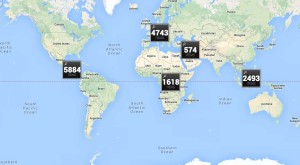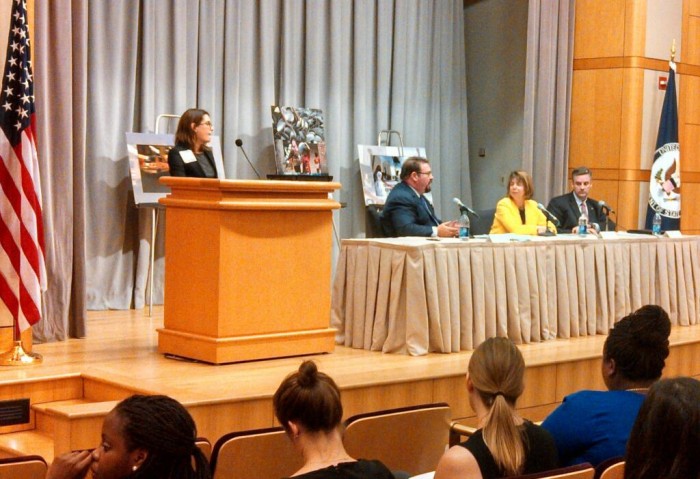Shared Hope commends Congress’ support of critical anti-trafficking legislation, marking a monumental achievement for anti-trafficking advocates
PRESS RELEASE
Arlington, VA (May 21, 2014)—Shared Hope International, a leading anti-trafficking organization, commends the remarkable bipartisan support of the U.S. House of Representatives in passing a series of five bills that will strengthen America’s response to child victims of sex trafficking. The bills include:
- H.R. 3530, Justice for Victims of Trafficking Act (JVTA)
- H.R. 3610, Stop Exploitation Through Trafficking Act of 2013 (SETT)
- H.R. 4058, Preventing Sex Trafficking and Improving Opportunities for Youth in Foster Care Act
- H.R. 4225, Stop Advertising Victims of Exploitation Act of 2014 (SAVE)
- H.R. 4573, International Megan’s Law
“We’re excited to see a growing intolerance for the factors that make trafficking flourish: demand for commercial sex with minors, online classified sites that facilitate the sale of children, and a disregard for the protection from exploitation of homeless, runaway and foster youth,” Linda Smith, President and Founder of Shared Hope International said.
Shared Hope International worked closely with the sponsors and co-sponsors of the bills, especially Shared Hope 2013 Pathbreaker Award recipient Rep. Judge Ted Poe, to draft and secure support for H.R. 3530, the Justice for Victims of Trafficking Act. The bill includes key provisions to deter demand for commercial sex with minors by clarifying the current sex trafficking law; encouraging police, prosecutors, judges and juries to target and punish buyers; and reducing affirmative defenses under the Mann Act for buyers by requiring them to show clear and convincing evidence that the buyer believed the child was an adult.
“Shared Hope International’s demand research, promotion of pioneering efforts of federal prosecutors to prosecute buyers, and encouragement of federal legislators to solidify these gains through statute has been fortified through the critical demand provisions addressed in the Justice for Victims of Trafficking Act,” Smith said. “This monumental victory aligns advocacy efforts, legislative priorities and law enforcement tactics to create an unshakable foundation of protection for America’s victimized and vulnerable.”
Congress’ unanimous support for five anti-trafficking bills is a reflection of the prioritization of child sex trafficking by federal legislators, initiated substantially by the leadership of Rep. Chris Smith, the original author of the foundational anti-trafficking law, the Trafficking Victims Protection Act of 2000 (TVPA). Today, as the scope and sophistication of trafficking networks advance, so do legislative solutions. The passage of International Megan’s Law tracks with global concerns about traveling sex offenders and the widespread problem of child trafficking. H.R. 3610, the SAVE Act, recognizes the increasing role of online classified websites in facilitating child sex trafficking. H.R. 4058 attempts to block the foster care to trafficking pipeline.
 In attendance were more than 70 people from over 15 countries representing government, law enforcement and non-governmental agencies. The purpose of this strategy meeting was to discuss the activities of the countries represented with respect to tracking the travel of TSOs from one country to another and notification of that travel to destination countries. It should be noted that it was accepted as a premise that the problem of TSOs is linked to the problem of human trafficking, particularly the trafficking and sexual abuse of children.
In attendance were more than 70 people from over 15 countries representing government, law enforcement and non-governmental agencies. The purpose of this strategy meeting was to discuss the activities of the countries represented with respect to tracking the travel of TSOs from one country to another and notification of that travel to destination countries. It should be noted that it was accepted as a premise that the problem of TSOs is linked to the problem of human trafficking, particularly the trafficking and sexual abuse of children. Rep. Judge Ted Poe and Senator John Cornyn cross-filed the End Sex Trafficking Act of 2013 on July 24, 2013. The bill has the purpose of clarifying the federal Trafficking Victims Protection Act (TVPA) and its criminal provision, 18 USC 1591, to include actions by buyers – through the verbs “patronizes or solicits” – as offenses of sex trafficking.
Rep. Judge Ted Poe and Senator John Cornyn cross-filed the End Sex Trafficking Act of 2013 on July 24, 2013. The bill has the purpose of clarifying the federal Trafficking Victims Protection Act (TVPA) and its criminal provision, 18 USC 1591, to include actions by buyers – through the verbs “patronizes or solicits” – as offenses of sex trafficking.






